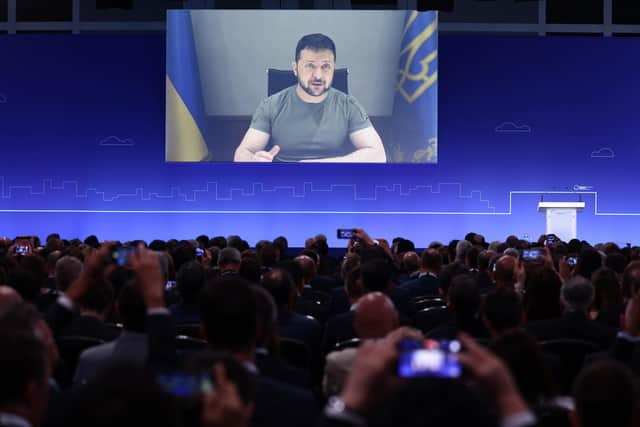Military operations in Ukraine rest on upcoming NATO summit in Vilnius - Patrick Mercer
Military operations, of course, rest on political imperatives - in this case the NATO summit in Vilnius which starts in just over two weeks’ time. Now, Kiev has already shown that she expects some concrete signal at this meeting about her future membership of the alliance and - whilst it has never been openly stated - it’s clear that, in parallel, the nations who are donating so much expertise and money to Ukraine need tangible signs of a Russian defeat.
This is high stakes stuff. Kiev successfully counter-attacked last autumn, but her casualties have been staggering, meaning that NATO has had to rebuild her forces and provide advisors almost every step of the way.
Advertisement
Hide AdAdvertisement
Hide AdObviously, Russia has also taken losses in troops and materiel, but she’s a much bigger country and, unlike Ukraine, her entire existence doesn’t rest on this campaign. So, the 12 new brigades which the West has built and equipped for Kiev have a huge responsibility: they’ve not only got to give Russia a bloody nose whilst showing that their country is a viable alliance partner, they’ve also got to validate all the plans, all the equipment and all training that NATO officers have poured into them.


And here’s the rub. At Vilnius the allies want to be able to pat themselves on the back, to demonstrate that their strategies can best Russia and that their doctrine and equipment (albeit used by a third party) can triumph on the battlefield. Most of all, they need a win after their debacle in Afghanistan and before President Biden asks America to re-elect him.
But, despite the hype of the media, this doesn’t seem to be happening. Whilst it’s right to say that Kiev’s main thrust has yet to develop and that we’re only seeing probing attacks at the moment, 20 or so days of incessant combat has destroyed a lot of Western equipment, ruined three or four of the new brigades and seized only a handful of villages without coming close to Russia’s main defences.
Even the Wall Street Journal - one of Kiev’s most ardent supporters - has had to admit that the Ukrainians “have mostly paused their advances in recent days”.
Advertisement
Hide AdAdvertisement
Hide AdSo why hasn’t Kiev yet enjoyed the same sort of success that she did last autumn? Well, the Russian air force now dominates the skies; new satellites gather excellent intelligence; plentiful artillery swamps Kiev’s guns but, most importantly, Ukraine is tasting Moscow’s regular forces for the first time.
It’s not widely understood, but the last year and a bit of this campaign has largely been fought by Russian paramilitaries, local militias and mercenary groups supported by some aircraft and regular artillery, but the full, doctrinally trained Russian forces are only now coming into action. And they’re fighting from carefully prepared trenches and redoubts with counter attack forces ready and thoroughly rehearsed.
It’s also a painful reality that Kiev’s troops have not been fully trained or prepared for the vital synchronisation of armour, infantry and guns - and they have very little air support. On top of this, the Western media have touted a luring offensive for months and now these callow ‘Storm Brigades’ have had to throw themselves frontally against the very targets that the press has already revealed. Couldn’t NATO have helped their clients rather more cleverly? Where’s the element of surprise? Where’s the manoeuvrist approach - the very creed of the Western war colleges?
Well, there are some who suggest that the Khakhova Dam was deliberately destroyed in order to drain the Dnieper and allow the Ukrainian forces to cross this mighty obstacle and outflank their opponents. Yet, anyone looking at the mud-deep, puddled wilderness that the river bed has now become, knows that no vehicles or guns will be crossing that anytime soon.
Advertisement
Hide AdAdvertisement
Hide AdNo, the truth is that political imperatives have driven military reality yet again. President Zelensky let it be known that he expected his troops to be in the iconic Mariupol having punched through to the Azov coast and isolated Crimea before the Vilnius conference even started. Certainly, there are signs that Kiev’s troops are now massing for a major push through the very areas in Zaporizhzhya that have already been fought over so bravely.
The trouble is, earlier probes were meant to pave the way, to breach minefields and soften up the defenders. In fact, the Russians have barely broken into a sweat.
Nowhere has the first line of defences been touched by Kiev’s troops and in some sectors there are as many as four mutually supporting lines of dugouts and earthworks to be stormed. Consider this: the closest point of the front line to Mariupol is roughly 45 miles, but in twenty days’ bitter fighting the Ukrainians have advanced no further than, at best, three.
Perhaps there’s a huge, surprise assault brewing that will carve through Moscow’s men: perhaps. But, with only a handful of troops now being trained in the West and the bulk of Ukraine’s forces made up of blunted veterans, I suspect that everything rides on a few thousand outnumbered men advancing through 40 miles of dense defences in 17 days. Indeed, there may be surprises in store. The most welcome one, though, would be an end to jingoism and a dash to the negotiating table.
Patrick Mercer is a former MP for Newark and Army colonel.